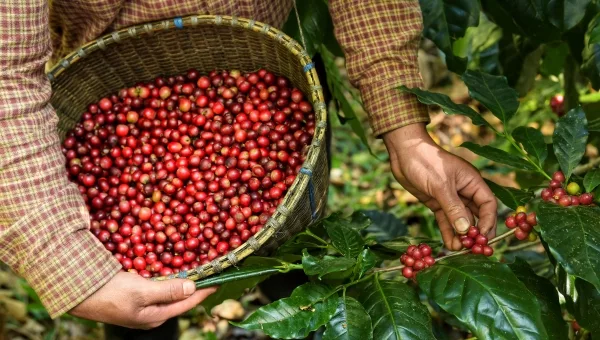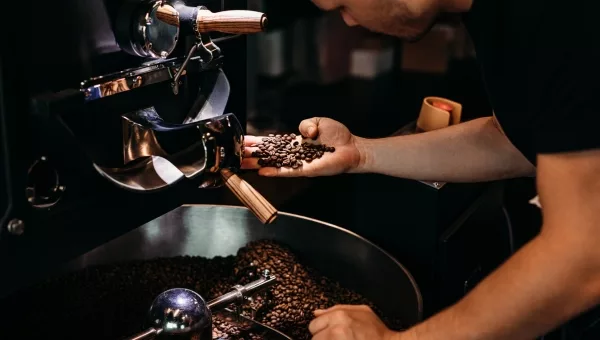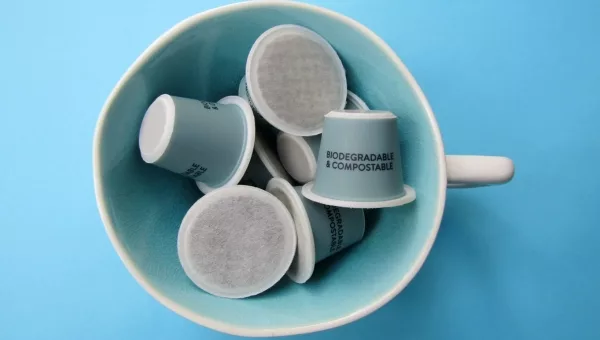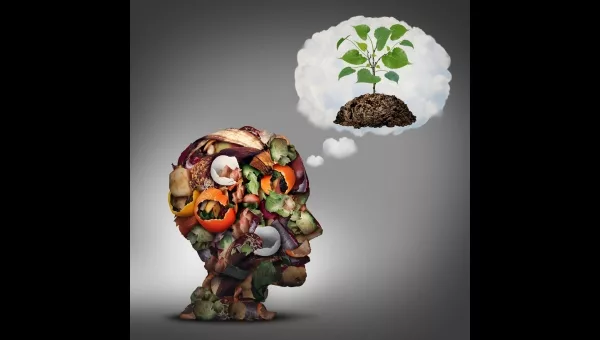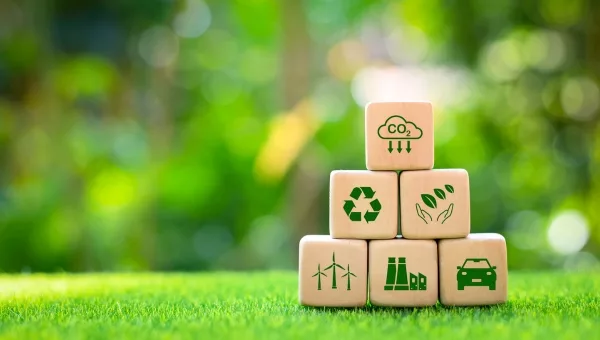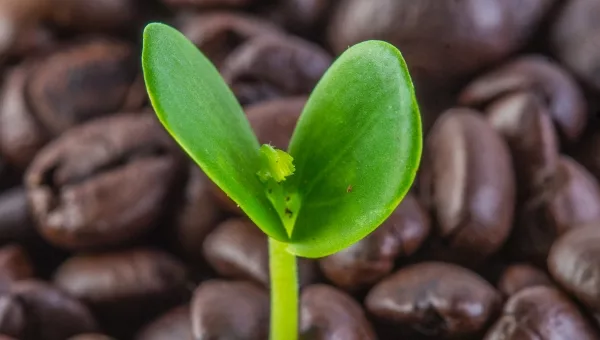
The virtuous cycle of Kabioca ecological coffee: from soil to cup to compost
Coffee, that delicious beverage that awakens our senses and stimulates our day, is much more than just a cup of caffeine. Behind every sip lies a real journey, from the fertile soil where the beans are grown to your cup, and even beyond, when the residues return to the earth in the form of compost. Today, on World Recycling Day, let’s dive into the virtuous cycle of eco-coffee and explore how it can contribute to a more sustainable environment.
1- From field to roaster: a meticulous and demanding journey
The adventure of coffee begins long before it reaches your cup. At Kabioca, this adventure was born of a deep desire to combine a passion for coffee with environmental responsibility. Our brand is committed to rethinking not only the quality of coffee, but also the container that holds it, by taking action to reduce the environmental impact of coffee capsules.
Growing organic coffee beans
This journey begins with the cultivation of organic coffee beans, without pesticides or GMOs for at least five years, carefully supervised by expert agronomists. Every stage, from flowering to fruit ripening, is meticulously controlled to guarantee beans of the highest quality. This attention to detail continues throughout the entire process, from harvesting to the meticulous selection of beans, including traditional roasting by our artisan roaster, Roberto.
-
Choice of varieties and land
Both the coffee varieties and the land on which they are grown are carefully selected. This meticulous selection guarantees not only high-quality beans, but also an approach that respects the environment and local communities.
-
Harvesting and drying
Coffee harvesting is a meticulous art, where each bean is picked by hand to ensure the highest quality. After harvesting, the beans go through a controlled drying process, where the humidity percentage is closely monitored to avoid any undesirable fermentation.
-
Sustainable farming practices
At Kabioca, sustainable agriculture is at the heart of all operations. Practices such as water management, biodiversity preservation and the reduction of chemical inputs are implemented to guarantee coffee production that respects the environment and the people who work there.
HARVESTING AND PROCESSING THE BEANS
Coffee harvesting is a meticulous exercise. The beans destined for Kabioca coffees are inspected by farmers and pickers. At the end of the harvest, they finish by removing all fruit remaining on the trees, to ensure the natural renewal of each plant.
2- From bean to cup : an alchemy of flavours and aromas
Roasting is a crucial stage in coffee processing, where green beans are transformed into richly flavored jewels. At Kabioca, roasting is a meticulous art, where each coffee origin and vintage is treated according to its own specificities. The result is a perfectly ground coffee, ready to reveal all its complexity in your cup.
THE ROASTING PROCESS
Roasting is a delicate stage in which green coffee beans are heated to high temperatures to develop their characteristic aromas. At Kabioca, this stage is carried out with the utmost precision to guarantee a high quality ecological coffee with every infusion.
-
Temperature and time control
During the roasting process, precise control of temperature and duration is essential to achieve the desired flavor profiles. At Kabioca, our master roasters carefully monitor these parameters to ensure even, optimal roasting.
-
Cooling and resting
After roasting, the coffee beans are rapidly cooled to stop the cooking process. They are then left to rest for a while to allow the aromas to develop fully, before being ground and infused.
ECOLOGICAL COFFEE GRINDING AND BREWING
Once roasted, coffee beans are ground to the ideal fineness. This grinding is essential to ensure optimal extraction of aromas during infusion. It’s one of the most technical stages of the process!
3- From eco-friendly coffee to compost, thanks to revolutionary capsules
But the story of coffee doesn’t end with the last drop in your cup. Faced with the enormous amount of waste generated by aluminum and plastic coffee capsules, we’ve set ourselves a mission: to create capsules compatible with Nespresso® and Dolce Gusto machines that are both high-performance and environmentally friendly.
THE BENEFITS OF COMPOSTABLE CAPSULES
Kabioca’s compostable coffee capsules offer an ecological alternative to traditional capsules, reducing the carbon footprint associated with coffee consumption. Once used, these capsules can be returned to the earth in the form of compost, offering numerous environmental benefits. Composting eco-coffee capsules helps enrich farmland, reducing dependence on chemical fertilizers. It also helps reduce the amount of waste sent to landfill sites, promoting more sustainable waste management.
THE COMPOSTING PROCESS
Composting coffee capsules is a simple but effective process. Once used, the capsules can be disposed of in a domestic or industrial composter. Over time, the capsules decompose naturally, turning into a nutrient-rich soil amendment. This compost can then be used to feed plants, promoting healthy, sustainable growth.
KABIOCA CAPSULES: AN ENVIRONMENTALLY-FRIENDLY INNOVATION
Kabioca offers two ranges of environmentally-friendly capsules compatible with Nespresso® and Dolce Gusto machines.
-
Nespresso organic compatible capsules
Our range of organic, Nespresso-compatible capsules offers quality coffees from certified organic farms. Available in several varieties, these coffees are encapsulated in home compostable capsules, certified Ok HOME Compost by TÜV Austria, and Ok Biobased 4 stars, for guilt-free enjoyment.
-
Dolce Gusto compatible capsules of plant origin
Our range of gourmet hot beverages in Dolce Gusto capsules is available in the first plant-based capsules on the market. These beverages are encapsulated in 60% plant-based capsules, certified industrially compostable by TÜV Austria and Ok Biobased 3 stars.
4- Back to earth : the loop is complete
Once the coffee capsules have decomposed in the compost, the end product is a nutrient-rich organic amendment, ready to feed plants. Compost can be used in a variety of contexts, both domestic and agricultural, to improve soil health and promote lush plant growth.
NATURAL FERTILIZER FOR THE GARDEN
Compost from coffee capsules is a high-quality natural fertilizer, rich in essential nutrients such as nitrogen, phosphorus and potassium. When incorporated into garden soil, it improves its structure and fertility, promoting the growth of plants, flowers and vegetables. Compost also acts as a soil moisture regulator, helping to prevent drought and erosion.
REDUCING WASTE AND IMPROVING THE ENVIRONMENT
Using compost from coffee capsules also helps to reduce organic waste sent to landfill sites, helping to prevent environmental pollution and reduce greenhouse gas emissions. By transforming food waste into a product that benefits the earth, composting promotes a more circular approach to waste management, closing the loop between consumption and production.
ENCOURAGING SUSTAINABLE AGRICULTURE
In the agricultural context, the use of compost can play a crucial role in promoting sustainable farming practices. By replacing chemical fertilizers with organic compost, farmers can improve long-term soil health, reduce dependence on external inputs and promote biodiversity in their fields. What’s more, composting eco-coffee capsules helps preserve natural resources by recycling organic waste into valuable agricultural resources.
Conclusion : a commitment to a more sustainable future
The virtuous cycle of eco-coffee, from soil to cup to compost, illustrates the importance of rethinking the way we consume and throw away. By choosing more sustainable options, such as compostable coffee capsules, we can all help preserve our planet for future generations.
As we celebrate World Recycling Day, let’s take a moment to reflect on the impact of our consumption habits and how we can all play a part in building a more sustainable future. Let every cup of coffee be not only a source of pleasure, but also a gesture in favor of the environment.
At Kabioca, our commitment to quality, innovation and sustainability guides every action we take. Join us in our mission to create a world where the pleasure of enjoying a good cup of coffee goes hand in hand with respect for the planet we all call home.
